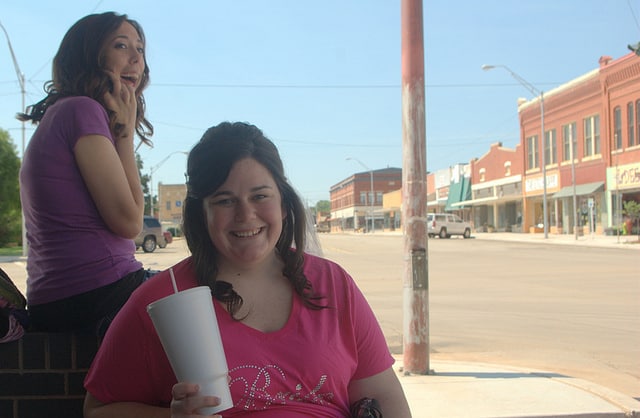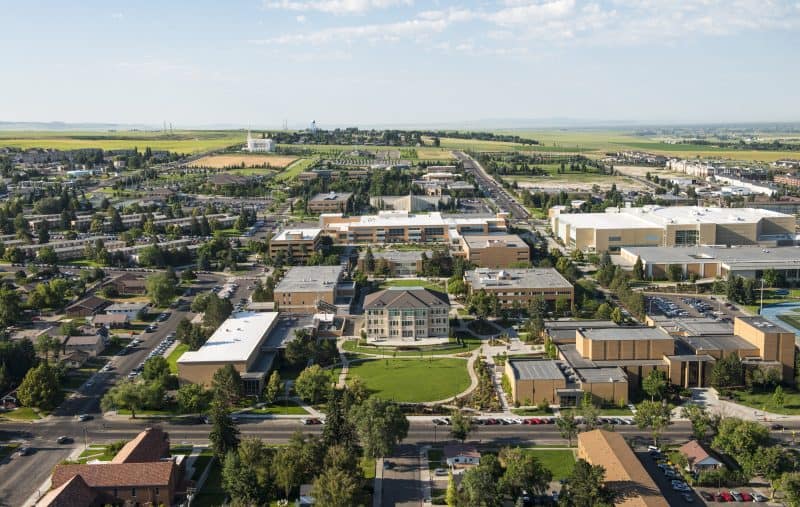
How do young folks find out that your town is the perfect place that they will be happy living? Photo by Becky McCray.
One of the top issues named in our recent Survey of Rural Challenges was how to retain young people. It ranked the number one concern in 2015, and number 2 in 2017.
One participant commented, “We have already identified that to survive, we will need entrepreneurial millennials who want to be rural by choice. The hard part is making our town of 1900 attractive enough for them to even consider us.”
How do rural places attract millennials? One example is the small city of Rexburg, Idaho, population 26,000, which has chosen to brand itself as Millennial City USA because over 80% of residents are under 30. While there is no direct comparison between a town of 1,900 and a small city of 26,000, there are some relevant action steps we can draw out.

When it comes to retaining young people, Rexburg, Idaho, benefits from being close to BYU-Idaho. Photo by Michael Lewis, courtesy of REDI
Regional economic development leaders have launched an effort to learn more about their rural millennials using a survey and focus groups.
“So much has been written about what urban millennials want, but this is the first time anyone has formally studied rural millennials to learn what drives them,” says Jan Rogers, president of the Regional Economic Development for Eastern Idaho (REDI).
The study found some interesting things about these rural millennials living in eastern Idaho:
- Facebook is the #1 social media platform used by rural millennials, while Snapchat and Instagram are more popular with urban millennials.
- Rural millennials prefer to live in an open area close to an urban center, rather than in the middle of a city or town.
- Rural millennials are more motivated by the type of work they’re doing than by pay or other incentives.
- Networking with peers, friends and family connections are how rural millennials find jobs, rather than on websites like LinkedIn and Indeed.
- Poor work culture is the number one reason that rural millennials leave a profession or a job.
Most rural communities have high median ages because their population skews older. The median age in Rexburg is 22. That’s 15 years younger than the national average. The growth of 18 to 35-year-olds is projected to continue: the Idaho Department of Labor estimates the millennial population in Eastern Idaho will expand 26% by 2025, compared to less than 3% nationally.
In addition to its size, Rexburg has a number of advantages in drawing millennials. Many graduate from Brigham Young University Idaho (BYUI) and Idaho State University (ISU) to reside in the Eastern Idaho Innovation Corridor, home to the Idaho National Laboratory and companies including Melaleuca and Progrexion. According to Hope Morrow, regional economist for the Idaho Department of Labor, the region’s three fastest growing industries are in the areas of finance, science/technology and healthcare. Millennials also enjoy year-round outdoor recreational opportunities at nearby Yellowstone National Park and Grand Teton National Park.
“Eastern Idaho has not only offered the professional opportunities that my wife and I need to make a good living, but it also offers the work-life balance that is important to us,” says millennial Mark Baker, who works as director of marketing for the Bingham Memorial Hospital in Idaho Falls. “It’s not uncommon for us to wake up on a Saturday morning and say, ‘Let’s go explore Yellowstone today!’”
In tandem with the “Millennial City USA” theme, REDI has launched a social media campaign to tell the story of Eastern Idaho’s attractions and lifestyle assets through the eyes of rural millennials. It can be found on Facebook, Twitter, LinkedIn and Instagram. REDI provided facts and quotes about Rexburg for this story.
Practical Steps for Smaller Rural Towns to Retain Millennials
Comparing your town of 2,000 with this small city of 26,000 can be intimidating, but there are practical lessons from the Rexburg example for towns of any size.
1. Listen to your millennials.
There are already young people choosing to live in your community. Ask them why they’re here and listen deeply to their answers. Don’t interrupt. I can’t tell you how many times I’ve watched older community members ask what younger people want, then interrupt their answers to tell them how wrong they are. Especially when a young person offers a comment about how little there is to do, older people rush in with interruptions about all the great things the young people are overlooking. Don’t do this. When you ask for their insight, take the time and be respectful enough to actually listen without interrupting. Focus on writing down what they are saying instead of responding.
2. Know your recreation opportunities.
You don’t have to have Yellowstone National Park in your backyard to offer great outdoor experiences and a quality of life that millennials will want. Take time to think about what you do have to offer and talk with young people you see in the outdoors. Let them tell you what they enjoy doing and how you can make more of it available.
3. Connect with regional educational institutions and employers.
Even if they aren’t huge, educational institutions and employers are anchors for your community. Reach out to ones that are nearby even if they aren’t in your town itself. Notice how Rexburg is taking advantage of the whole region to connect with young people. Follow that example.
4. Improve work culture.
Bring in outside resources to offer business training and to help your businesses understand what “work culture” means and why they need to change how they think of and treat the people who work for them. This is a tall order, but one that can pay huge dividends.
I’d love to hear your thoughts as well. What helps connect young adults to your community?
New to SmallBizSurvival.com? Take the Guided Tour. Like what you see? Get our updates.











Excellent article! We are working to attract and retain more young people in Venango County, Pennsylvania, through an initiative called Be Here (beherevenango.org). It’s a regional effort and we have about 50,000 people in our county. This article provides great insight and advice. Would you mind if we shared it on our “News & Events” page? We’ll be sure to credit the author and website and link to the original article.
Ashley, you’ve done a great job with Be Here! I’m sure it will inspire some other places to speak directly with their young people. You are welcome to use this article and give credit here. Thank you!
We’re getting some interesting feedback from other Millennials on Twitter. Be sure to click through to follow the replies and discussion:
As a rural millennial who moved to a nearby small city, I moved because there were few jobs for someone of my skill set and nothing to do besides go to the town bar(s) and the pool in the summer.
Or church. There’s always church.
And barely anything is open in the evenings or on Sundays with the exception of the bars.
Thanks for sharing your experience, Donna. It helps show the challenge.